Hubbard’s Hills Deaths, Louth, Lincolnshire.
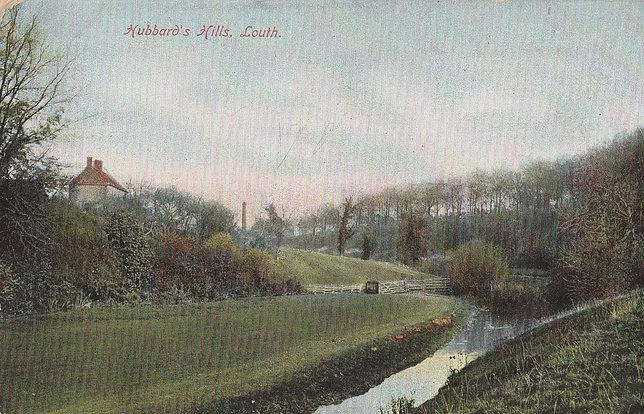
1/ September 1862
An old and respected citizen of Louth, Mr James Parker, clerk to the income tax inspectors, having been missing since seven a.m., with friends and relatives worried about his mental and physical condition was discovered at Hubbard’s Hills. The body was in the stream at the base near the new reservoir. The coroner, Thomas Sharpley, held an inquest at the Fleece Inn when evidence was given which satisfied the jury that the deceased was not responsible for his actions. A verdict of “Temporary Insanity” was accordingly returned.
2/ May 1879
The body of little George Patrick Benton aged six years was accidentally drowned in the reservoir of the mill in Hubbard’s Valley one morning. The body was taken to the parents’ house in Crow Tree Lane where the jury would later inspect it. The child fell in at the corner of the new bridge leading to the Water Company’s engine house. Mr Teesdale, the steam and water mill owner, was told that there was a young lad in the water at about twelve o’clock. The body was taken out, and medical assistance was summoned. The older brother aged eight, said they had both gone to get some water for their father and a youngster was playing with a boat on the stream near the Water Company’s main pipe when the lad’s foot slipped and he fell in. The brother shouted to a miller but he couldn’t hear him so he ran to get a neighbour named Crisp, as the mother was at the Union seeing about relief. When they found him he was quite dead, as he had been in the water ten minutes or so. The verdict was “Accidentally Drowned”.
3/ March 1884
The body of a newly born baby girl was found in the mill dam at Hubbard’s Hills. The people who found it thought it was in Hallington but it didn’t matter too much where the inquest was held. The coroner wasn’t sure if the infant had been born alive or not. Joseph Sykes spotted the little bundle while he was sat on the asphalt bridge against the waterworks. They hooked it in and opened it, to find the dead female infant inside. He said the child was not in the decomposed state that the jury saw it in and its head was under its arm and the nose flat to its face with the legs doubled up. The surgeon said she was well-nourished and had no signs of violence upon it. The umbilical cord was torn and not cut. From the blood spots on its lungs and the state of the brain, it was probably suffocated and was born four to five days ago. There was no doubt it was a case of foul play.
4/ (Sad Death of a Lunatic) January 1888
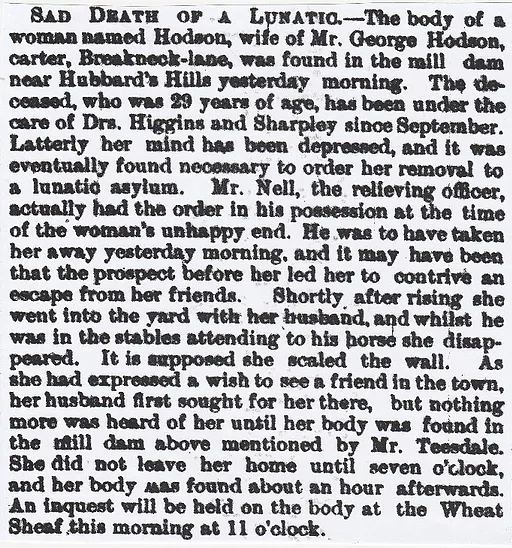
5/ Greyhound Inn, Louth, December 1833
A tragic accident occurred as the landlord of the Greyhound Inn was removing a coat, which belonged to a customer when a loaded pistol in one of the pockets discharged its contents into his body. He died on the spot, almost immediately.
6/ Louth Canal, February 1909 (Ice Skating Fatality)
Miss Ida Brewer was drowned on the Louth Canal when the ice gave way while she was skating on it.Sidney and Oswald, her two brothers, and a lad called Ernest Shearsmith, also fell in but were pulled out. Rather coincidentally, Miss Brewer, had told a friend that she had made a will “just in case she drowned”.
7/ Ship Inn, Louth, (Man Boiled to Death) November 1833
James Bullivant, a brewer to Mr W.Jackson of the Ship Inn, Louth, was a bit chilly one night, so he lay on the cover of the brewing copper to gain some warmth but it caved in and he plunged into the boiling liquid. He lingered until the next day when he finally expired from the dreadful scalding.
8/ Louth, May 1882
Edward Carrott, a retired farmer, committed suicide. The family had a history of this type of thing, as his father drowned himself in the River Lud about thirty years ago and his wife also killed herself by drowning about four years ago. He cut his throat with a razor. The verdict was “Temporary Insanity”.
9/ Unknown House in Louth. Anybody know where this is? (A.James, Ramsgate House, photographer)
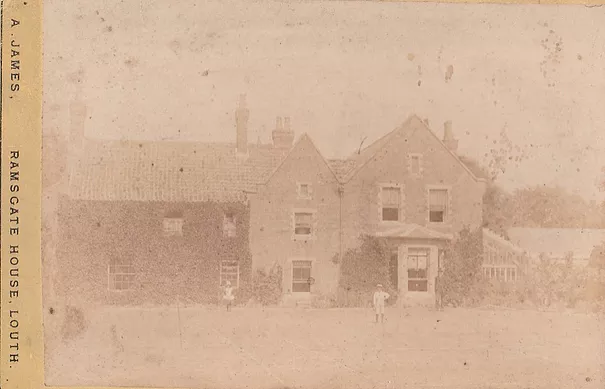
10/ Turk’s Head/ King’s Head/Humber, October 1867
Joseph Tuxworth from Walkergate in Louth, formerly an ostler at the Turk’s Head (ostler-looks after the horses at an inn but now the brewer at the King’s Head Hotel) left Louth to go on an excursion to Hull Fair on Friday the 11th and hasn’t been seen since. His friends fear that he has met with his death and with this headline appearing in a Hull newspaper it made them believe it was him.
“Yesterday, the body of a man about fifty years of age was found floating in the Humber near Earles Cement Works. He was wearing a pair of torn trousers, white shirt, and boots. The arms and legs appear to have been broken. The body is not yet identified.”
The body is believed by friends to be that of the missing man but cannot be 100% positive.
11/ King’s Head Hotel Fatality, October 1867
One afternoon a dreadful accident occurred to a man named Thomas Johnson, who was temporarily engaged as the brewer at the King’s Head Hotel in Louth. He was attending to his avocation when he accidentally fell from a ladder into a quantity of boiling beer, which had just been drained from the copper into the cooler. He was severely scalded and removed to his own home when after lingering in the greatest agony for four days, death terminated his sufferings.
12/ Turk’s Head, Louth, (Brewer Falls in Boiling Liquid) May 1859
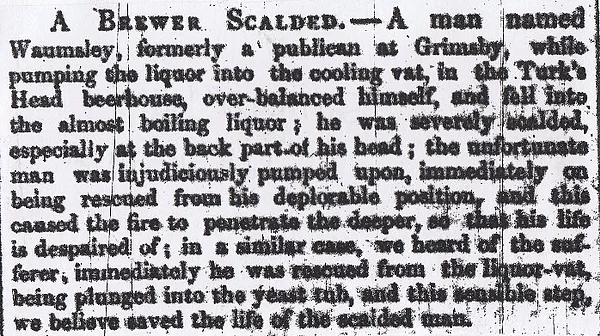
13/ Woodman Inn Suicide, Louth, July 1890 (Now a funeral parlour!)

Louth Railway Station (Accidents and Suicides)
14/ December 1856
A fatal accident occurred at Louth Railway Station when the Reverend William Mason aged fifty-eight, of Bilsby near Alford, was stood on the platform with his daughter waiting for the return train when an engine came through the station and caught him by the coat. He was entangled in the crank and was dragged underneath the moving train and then dashed upon the platform. The Reverend was killed on the spot.He leaves a large family.
15/ March 1901
Henry Jenkinson, an engine cleaner, was crushed to death at Louth Railway Station on the Great Northern line. He was standing by the buffers on a siding when some carriage buffers caught him.
16/ December 1905
Benjamin Sindall, a guard on the Great Northern Railway, was killed by a train at the same moment he was waving and shouting at a woman, whom he believed to be in danger at a level-crossing.
17/ September 1870 (Suicide)
John Odling, around sixty years of age, placed himself across the rails on the up line of the Great Northern Railway at Louth. Sergeant Wilkinson went round to his house the week before, to see about an attempted suicide and he found Odling with blood coming from his neck and he was soaking wet. He told the policeman that he fell into the beck. There was no definite evidence as to whether he meant to kill himself but he was depressed and only living on three shillings and sixpence a week from the Union. A platelayer saw him about a mile from Louth walking the line towards Fotherby and he never said anything to him. He was ordered to stay off a friend’s premises due to some kind of misconduct, plus the likelihood of being done for attempting suicide he decided to do it properly this time.
18/ Louth Railway Station Suicide, August 1879
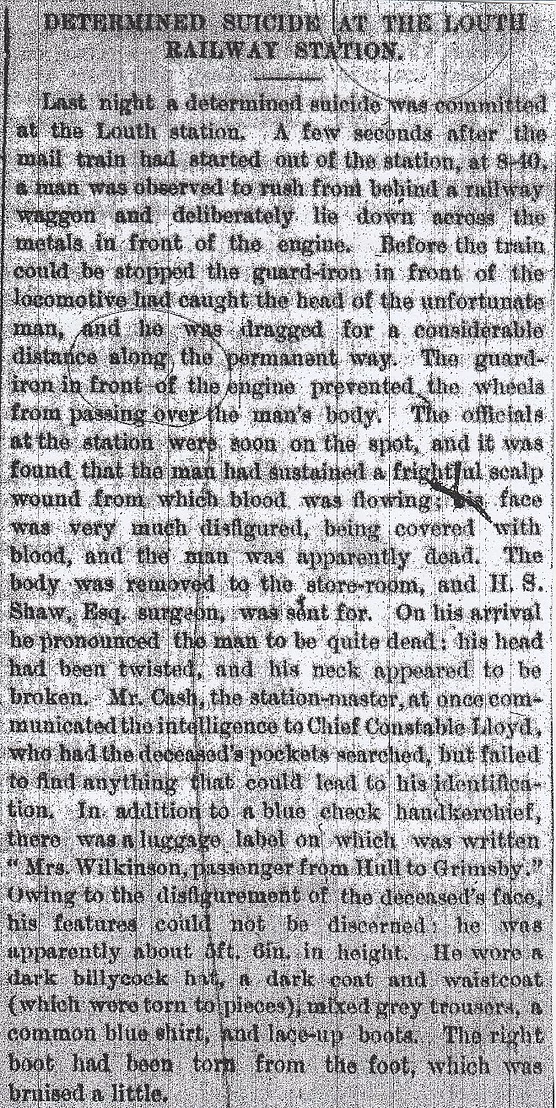
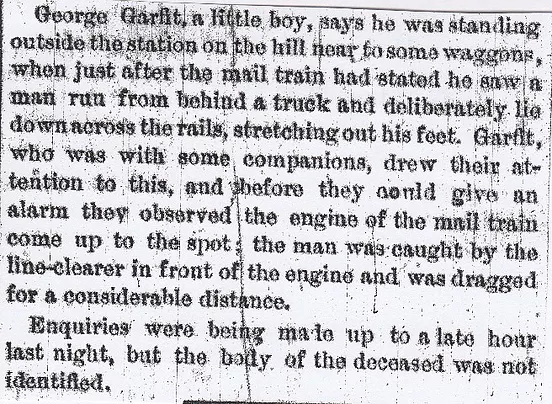
19/ Louth Railway Station (Fatal Accident) August 1885
Thomas Goulding, a shunter, was killed at Louth Railway Station while the carriages were being shunted, he was knocked down and they ran over his body. His body was placed in the waiting room. The accident occurred just outside the north end of the station and probably happened when the deceased rode from the platform on one of the coaches, then fell backwards onto the tracks, with two or three coaches going over him. It happened at 1-30 a.m. and several people said he’d been drinking. he was thirty-one years of age and leaves a wife and one child.
20/ Near Louth Station February 1875
John Twigg, a relieving clerk in the employ of the Great Northern Railway Company who lived in Lincoln, was killed near Louth Station as he tried to catch a moving train, when he fell over and was run over by it. He ran for about a hundred yards after the train and got past the bridge, then he fell and went under the carriage. He was insensible when found and carried back to the station having been badly mangled. Fracture and dislocation of the ankle, gashes on his leg, plus he was suffering from shock. A doctor decided to amputate his leg and he was given chloroform and he finally died in hospital from his injuries the following day.
21/ Missing Police Inspector, Louth, October 2nd, 1880
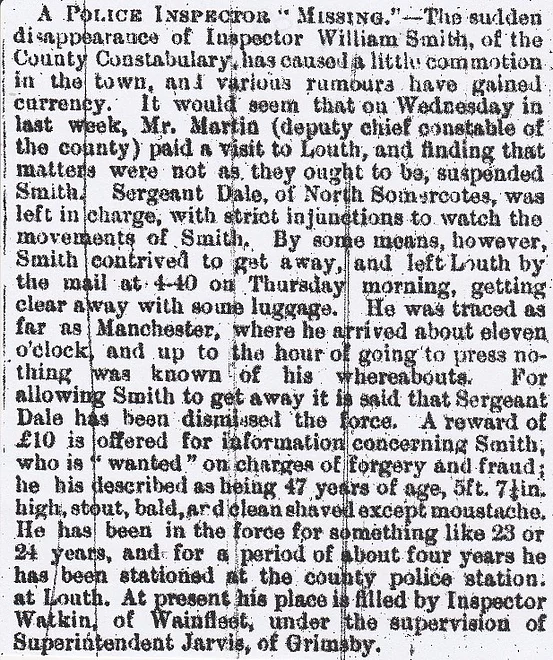
Missing Copper November 6th, 1880
Inspector Smith of the County Constabulary, who absconded from Louth a short time ago, is now in custody in Lincoln. He was apprehended whilst in bed at a house in Arthur Street, King’s Road, Chelsea, by Supt.Jarvis of Grimsby and placed in a Metropolitan police cell. As it was said he would commit suicide before he would be taken back to Lincolnshire, every precaution was observed; his coat, vest, shoes and braces were removed and he was left on a wooden bench with a rug for a blanket until next morning. He was brought before Lincoln magistrates on Monday and remanded. He will probably be committed for trial at the assizes, which take place at Nottingham next week. (What happened to him?)
22/ Upgate, Louth, (Prostitution) February 1880
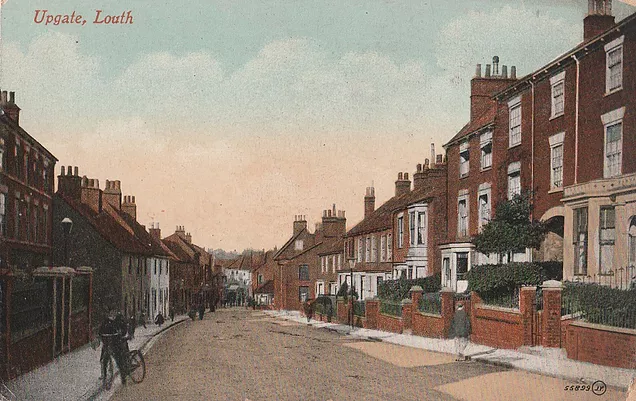
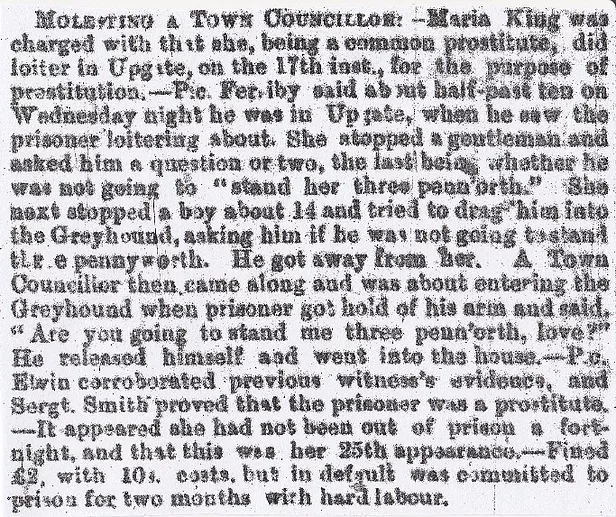
23/ Green Lady of Thorpe Hall, (Ghost/Haunting) January 1884
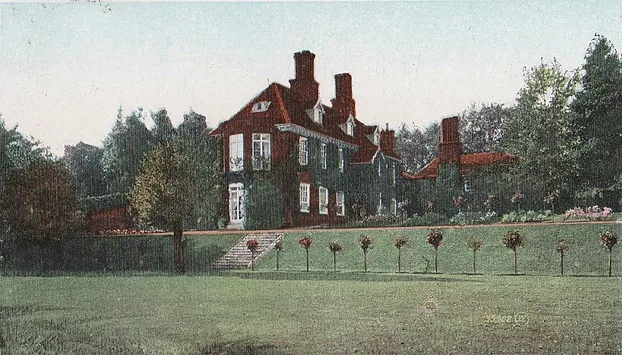
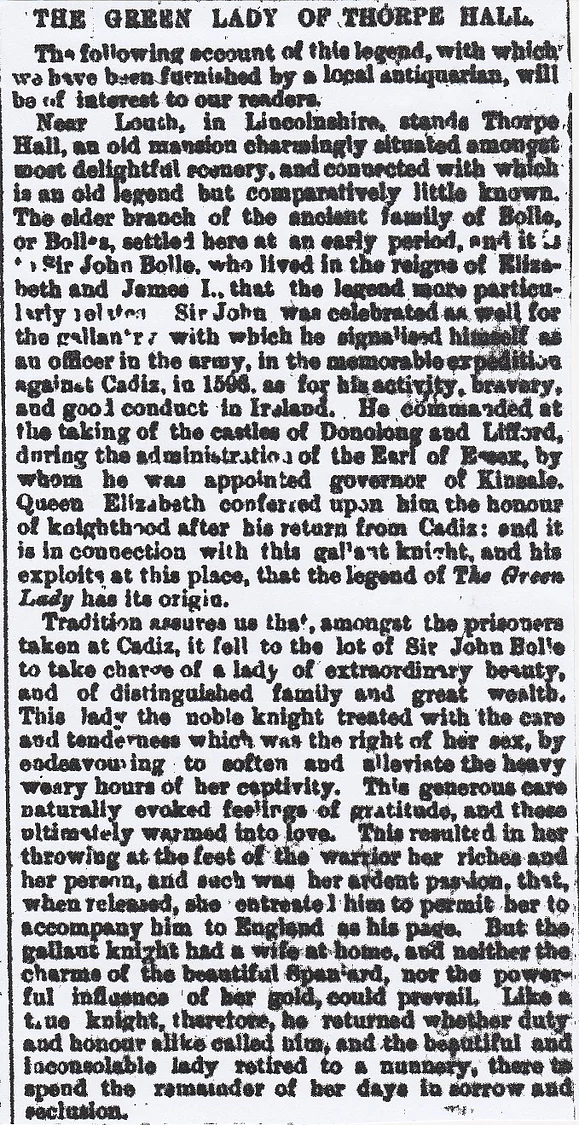
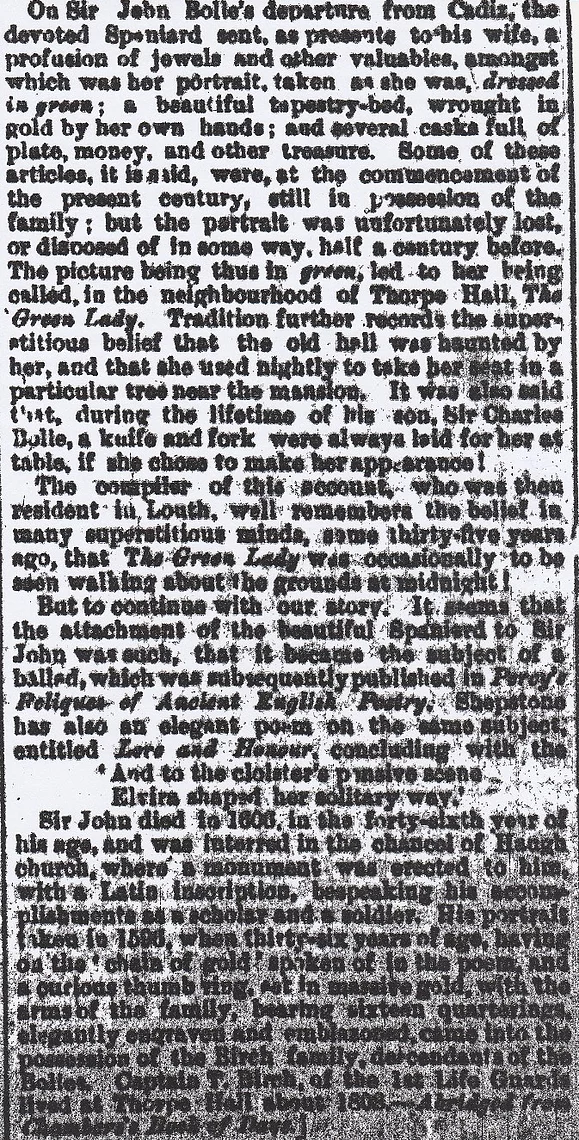
24/ Louth Union Workhouse September 1880
George Robinson, alias “Cheeks” and William Chapman were both inmates of the Workhouse and both under medical treatment in the sick ward. Robinson was there for heart disease. A quarrel took place between the two of them, walking sticks were waved and used, bad language flowed out and Chapman had a black eye. It was all about some money given to another inmate named Hill, given to a man named Wright for waiting upon him. After the initial fight, they got up and were at it again. Chapman was shoved over and Robinson went to sit down. After a few minutes, the colour went out of the face of Robinson and he was found to have died. No doubt it was due to his heart disease that he expired so quickly.
25/ Willows Lock Corpse, Louth, April 1869 (Between Keddington and Alvingham)
An inquest was held at the house of Alfred Ticklepenny, Louth Park, on the body of 23-year-old James Davey, mate of the sloop “Hawk” who was drowned in Willow’s Lock at 9-30 a.m. one morning. He was drawing up the dam of the gates to let water into the lock when the handle slipped all of a sudden and he fell into the river. The force of the current rushing strongly into the lock, he was dashed against the gates and washed in therewith. The lock is very deep and had no appliances to render help, he sank and his body was not recovered until 30 minutes later. “Accidental Death” was the verdict.
26/ Louth Parish Church Fatality, February 1880
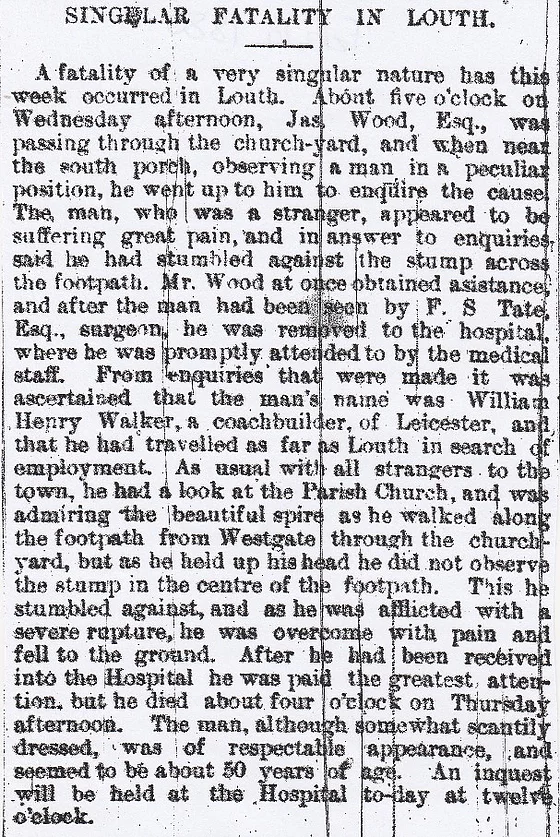
27/ Louth Suicide by Poisoning, May 1871 (Stealing a Postage Stamp and Rioting in Grimsby)
25-year-old Sarah Graves, a domestic servant, poisoned herself with her body being viewed by the jury at her sister’s, Mrs Dale on Grimsby Road, nearly opposite St Mary’s Lane. She pointed out that her sister had come to her from Alvingham and she’s been working as a servant in Grimsby with Dr Holland. She was accused of stealing a postage stamp which had been marked by the doctor. She was fired and she had gone to her sister’s in Louth to look for a situation there and to buy a new dress. The woman at the register-office, Mrs Brogden, said she’d have nothing to do with her anymore and she left extremely upset. Next thing she knew she could hear her upstairs, let out a scream and she told her sister she had taken poison. The doctor arrived at 4-30 p.m. and she was dead by 6-30 p.m. The chemist admitted to selling her a packet of “Battle’s Vermin Killer”. Mrs Brogden said tried to find her a situation at Alford but a letter from Mrs Holland, telling her to wipe her name from her books, changed her mind. Her boyfriend then went to Mrs Brogden’s and asked about what had occurred, when she gave him a copy of the “Lincoln Gazette” and he said he’d finish with her as well. The verdict was “Sarah Graves administered poison to herself, that contained strychnine, while in a state of unsound mind. (See also Grimsby No. 72)
28/ Ticklepenny Lock Suicide, Louth, June 1886
48-year-old Charles Turner, a groom of no fixed abode but formerly of North Somercotes and Louth, met his death by drowning himself in the Louth Navigation just below Ticklepenny Lock in the parish of Keddington. He went out to look for work as he was unemployed and went to stay at the Livesey Arms in Ludborough, with a relative, Mrs Hewson, but came back to Louth unsuccessful. He then went to stay with another relative, a grandmother called Mrs Hewson who ran the Woolpack Inn pub in Louth. Turner had left his children with her when the wife had died and on this occasion, he seemed really disheartened and said he’d be better off dead. The coroner gave the verdict that “Charles Turner threw himself into the Louth Navigation in Keddington and was drowned, at the same time he was not of sound mind”.
29/ Wesleyan Chapel Death, Eastgate, Louth, April 1876
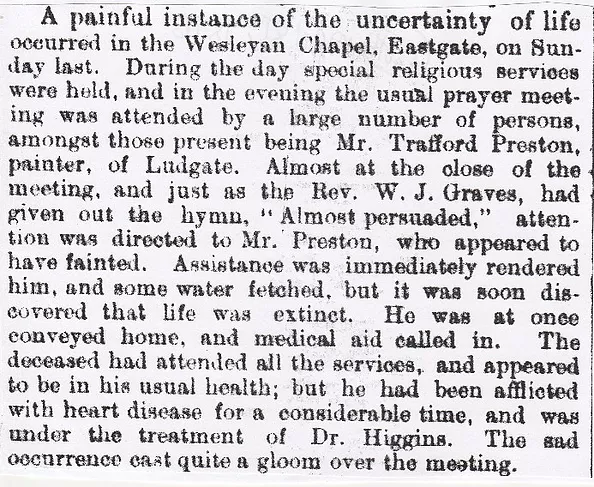
30/ Norfolk Mill Suicide, Louth, August 1874
A young woman aged twenty-seven, named Sarah Ann, the daughter of Mr David Bee, a saddler, who was married about four months ago to William Cloughton Allen, a confectioner from Leeds formerly of Louth, was found drowned in the lock-pit near Norfolk’s Mill at 7-15 p.m.
It appears she left her home and was last seen alive by friends on the previous night (13th August), just after eight o’ clock and not returning during the night information was given to police, who found her drowned in the place mentioned. She had come home from Leeds for the benefit of her health, all because she kept getting severe pains in her head. She was due to return to Leeds with her husband, who had come to Louth to accompany her to Leeds but she “committed suicide while in a state of unsound mind” according to the jury’s verdict.
31/ Spring Gardens, Louth, June 1877 (Death of a Child)
The death of an unnamed female child of Eliza Wilson, a single woman of Spring Gardens. There had been tons of gossip about how the child died circulating around Louth but thankfully the inquest put pay to these rumours. Eliza Wilson gave premature birth to the child on a Monday night or early Tuesday morning, with her birth accelerated by the violent treatment that her husband dished to her with regular slaps and punches. The woman who attended the birth, Isabella Brown, believed that it was stillborn and that the mother had two black eyes when she arrived and took care of her. She told of how the child was fairly crushed and it neither breathed nor cried when it came out. It knees and ankles appeared to be broken also and it did not fall on the floor at all. The post-mortem suggests that the child was probably dead, approximately five to six days previously.
It sounds to me as the husband punched her in the stomach, causing death to his own daughter!
32/ Louth Navigation Canal, (Drowning Accident) June 1886
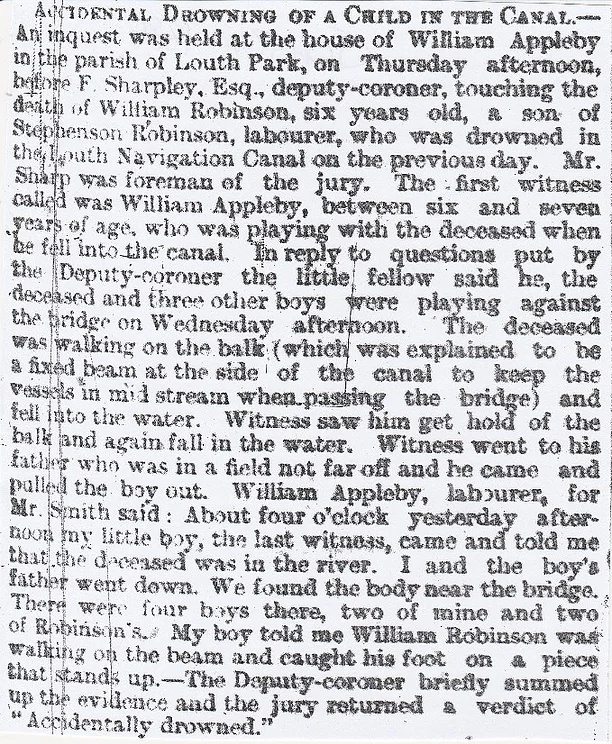
33/ Louth Workhouse Suicide, January 1883 (Workhouse entrance was the Hospital entrance now)
Mary Ann Swaby was a 48-year-old inmate of Louth Workhouse who was found hanging by the neck, stone cold dead at six a.m. one morning. She had been at the Workhouse since April, a good eight months or so and who suffered from depression, but was showing signs of getting better. She had been in the sick ward ever since arriving in April. Swaby told her room-mate that she was going to the toilet late one night and the next time she heard about her, she was dead. The nurse who found her, Elizabeth Russell, found her hanging from a balustrade with her feet three inches from the floor. The handkerchief with which she hanged herself was twisted and not tied in a knot.
34/ Ryley’s Brickyard, Louth, August 1884 (Two Boys Drowned)
In a piece of waste ground lying between Eastgate and Monk’s Dyke Road is known as Ryley’s Brickyard, which was the scene of a double tragedy. Clay was obtained from the pit to make bricks and this is now filled with water, which is approximately forty feet deep in places. It is an ideal bathing spot for young boys and girls in the area and during winter and when it freezes over it attracts skaters and sliders. The boys had gone there on the 20th August, just after dinner time and Charles Brumhead, the younger of the two brothers, aged twelve, went in first and was seen to be struggling by his brother, thirteen-year-old David Brumhead, who was just getting undressed. David plunged in to save him. Hogarth who was nearby feared that both would be drowned if he didn’t help, so he dived in. He pulled out David and when he went to go back for Charles, he again saw David back in the water. Both boys sank like stones and the verdict was returned as “Accidental death”.
35/ Spring Gardens Suicide, Louth, August 1905
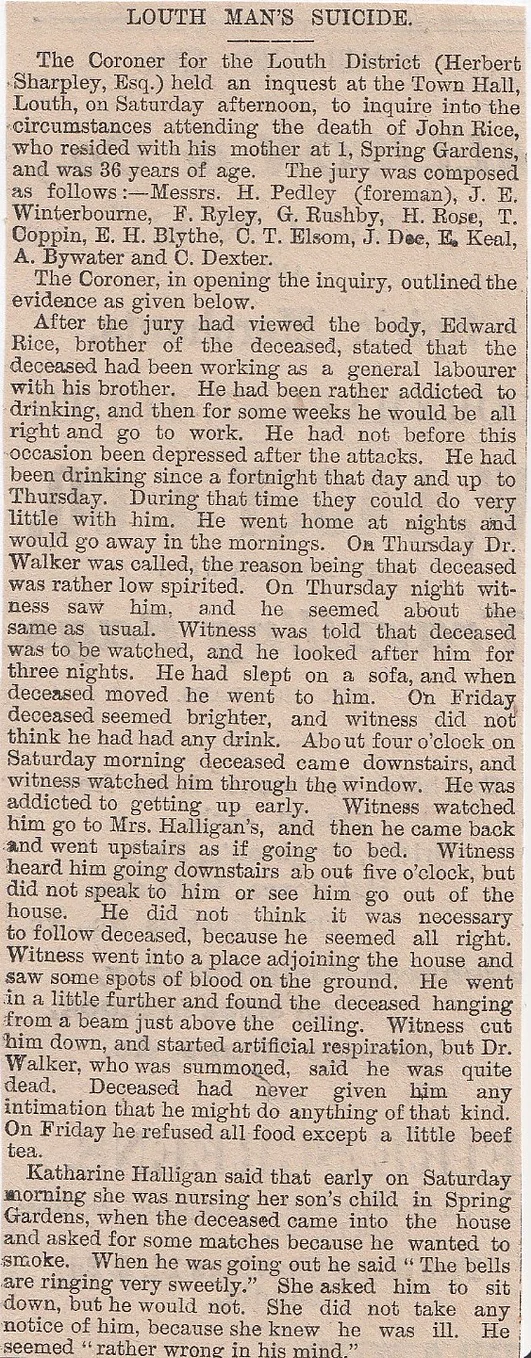
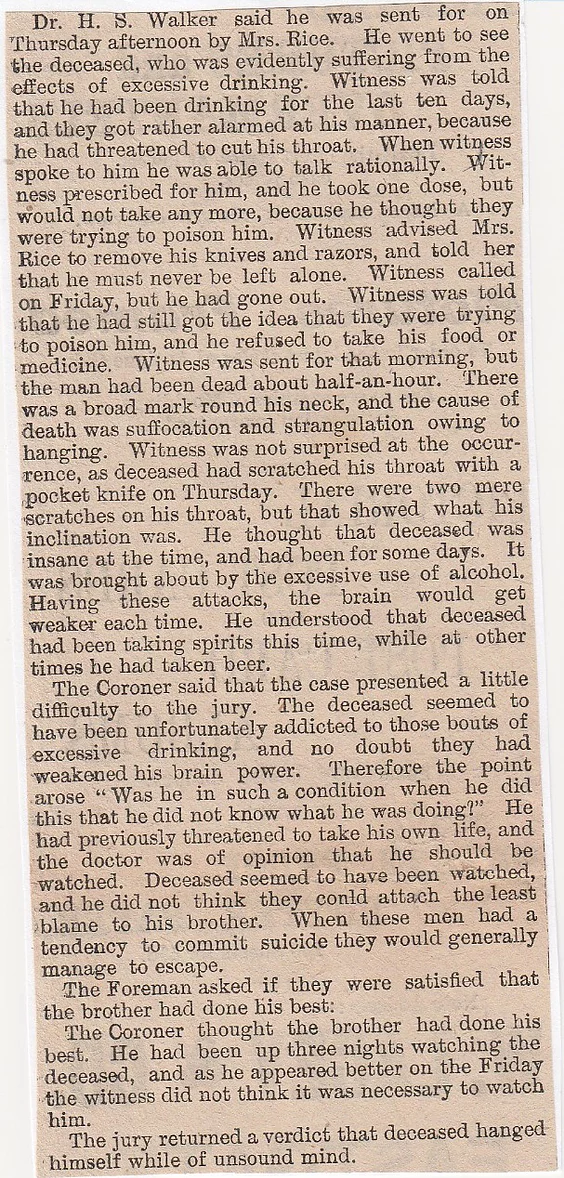
36/ Louth Navigation Canal Suicide, March 1884
James Ingoldby aged twenty-four was found drowned in the basin of the Louth Navigation Canal. He had probably committed suicide due to lack of sleep and being very poorly. He suffered from a delusion and on top of this, plus he was partial to a drink or two. The delusion was that Sergeant Smith had sent him a paper and this had preyed on his mind very much. The deceased had often mentioned that he would rather be dead than live on like this, and the fact that he had an accident when he was six years old that caused him to have seizures but they left him as he got older. A man by the name of Jackson found the corpse along with a hat and a butcher’s coat, so he hooked the young man to the bank. The verdict was one of suicide.
37/ Newbridge Hill, Louth, June 1870 (Fatal Accident)
A fatal accident occurred at R.J. Nells Great Northern Cake Mills, Newbridge Hill, Louth, to the engineer, Thomas Sutterby, who was found dead on the floor of the engine-house, at about 2-45.p.m. Nobody witnessed the dreadful accident. It is believed he was oiling the engine and got his arm entangled in it, and on extricating himself, he was hit on the head by one of the governors (large iron balls by which engines are regulated) and knocked down on the pump which supplies the boiler with water. His head was gashed quite badly and had a broken arm. He was left alone for about an hour, before the accident, so it could have occurred somewhere in that time span. He was pronounced dead at the scene and sadly he leaves a widow and three children.
38/ Cemetery Lane, Louth, April 1876 (Burning Fatality)
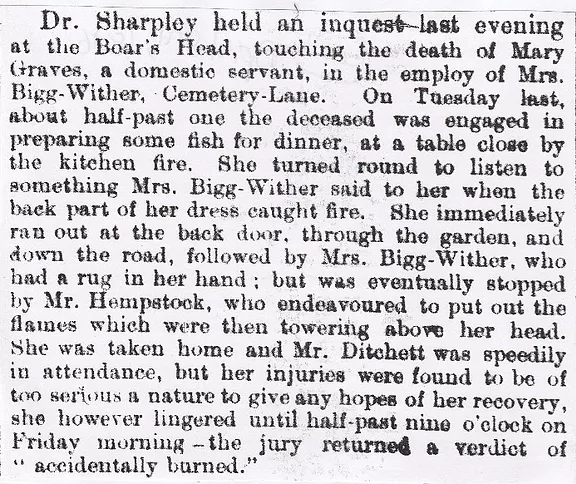
39/ Louth, (Fatal Gun Accident) September 1860
An inquest was held at the house of Mr Schofield of Wood Lane, on the body of John Schofield aged sixteen, who lost his life in a terrible accident. A lad named Woolhouse who worked for Mr Luck, was engaged in frightening away the birds from a wheat field one Sunday, with a gun charged only with powder. Schofield went up to the lad and took a handful of pebbles, then putting the butt on the ground and putting his hand over the muzzle, he carelessly flicked the trigger. The gun went off, passing through his hand, then his chest. He was killed at the scene. The verdict was “Accidental Death”.
40/ Willows Lock, Louth, January 1882
Just for a change, there is another case of somebody killing themselves by drowning in the town of Louth. William Barton decided to end it all at Willows Lock when he spotted by witnesses to plunge straight into the canal. The inquest was held at Mr Ticklepenny’s house at Keddington and it was said that he committed the fatal act not too far from there. He was seen rushing past the gardens at Holmes Lane heading to Keddington in a real hurry. The doctor of the deceased said he came to him complaining of sleepless nights and the doctor had twice treated him for delirium tremens (shakes alcoholics get after withdrawal). Charles Marshall saw him coming down from the Alvingham Road by the side of the river, then put his hand on the side of the lock, then leapt in. Everybody who saw him that day said he looked like a man on a mission, and in a real hurry. This was definitely a case of “Suicide whilst of unsound mind”.
41/ Newmarket, Louth, December 1871 (Woodshed Suicide)
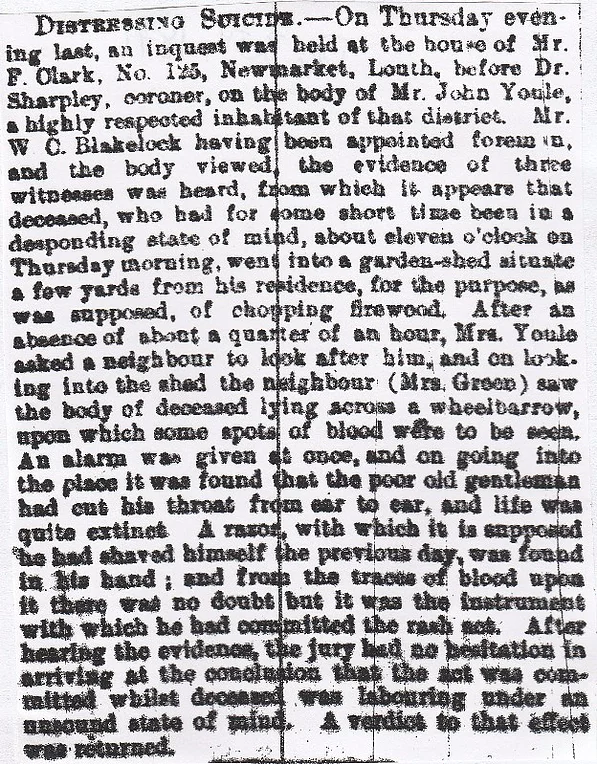
42/ Spital Hill, Louth, (Off South Street) (Child Mansaughter?) January 1877
This story was regarding the death of an illegitimate child of Eleanor Brown of Spital Hill. The little infant, Charles Butters-Brown was only seven weeks old and whose mother, Eleanor, was the mother of several other illegitimate children. This was the only one under an inquiry. They lived in a wretched hovel in Spital Hill and Charles had been ill for a few days so she had put it to bed to rest then went downstairs, returning after twenty minutes, when its breathing seemed low. She ran to a neighbours house and they came in and Eleanor said she thought it was asleep and shook it. After half an hour, the little mite was dead. By all accounts, it was a sickly child and gave it five drops of Godfrey’s (presumably some type of oil/linctus) and bizarrely took the label off the bottle the previous day to the child’s death. The father, Charles Butters, gave such ridiculous answers at the inquest he was warned several times by the coroner. He was drunk as a skunk when he was there. The doctor who examined the body said there were no marks of violence on it, but a couple of scars and he believed he died of natural causes.
43/ Spital Hill, Louth, (Death of Baby in Hovel) May 1878
The inquest here was regarding the body of the unnamed male child of 21-year-old Rachel Smith, who died under painful circumstances. A neighbour of Rachel Smith’s, Mrs Winters also of Spital Hill, popped in to see her as she was aware that she was pregnant. What met her gaze, was the newly-born child on the floor and Rachel Smith all alone in the house. The child was alive and Mrs Winters picked it up, but the little one died fifteen minutes later. Rachel was a single woman and the house was a real dump and Mrs Winters knew she was pregnant but wasn’t aware she was so close to giving birth. The body of the child was shown to the jury and the tiny box it was in was passed around for them to view. Mrs Winters said that her husband was the steward for the houses and that the girl had told her she was three months off her confinement but said she wouldn’t go the Workhouse, as her sister in Grimsby would take care of everything. Rachel had been walking the streets the previous night with nowhere to go and Mrs Winters put her in the accommodation she was in now. She saw her in a corner saying “For God’s sake, fetch me a bed” and she thought that she would be a mother in a moment or two, so she went to get someone but when I came back she moved her dress and the baby was underneath it, on the floor.
No blame could be attached to anyone for the death of the child, said the coroner, although her awful living conditions didn’t help.
44/ Hutson’s Yard, Eastgate, (Starving Woman) June 1870
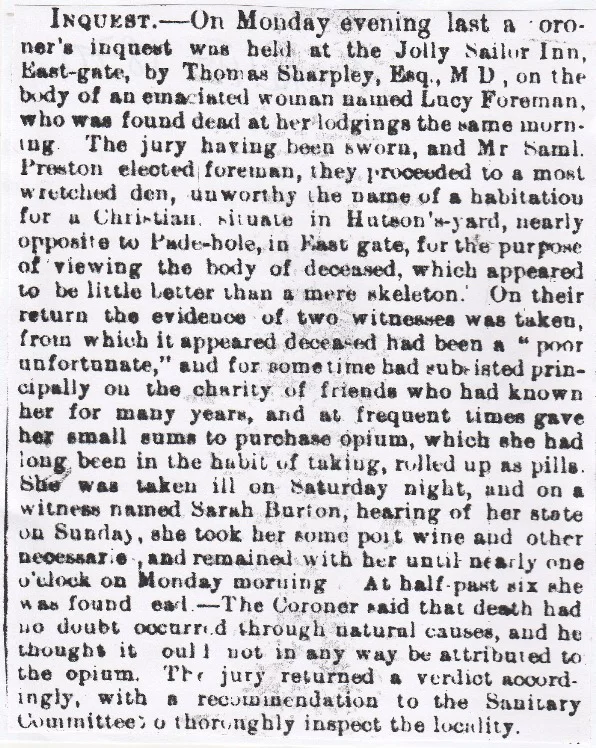
45/ River Lud, Louth, (Infants Body Found) December 1871
An inquest was held on the body of a male child which had been found floating in the River Lud, near to Mr Newman’s mill at the Riverhead, by a man named William Padley. From the decomposition of the body, it could not be ascertained whether the child had ever breathed. A handkerchief and a piece of flannel in which the body was wrapped are now laid at the police station for the purpose of identification.
46/ Jolly Sailor Inn, No. 47 Eastgate, Louth January 1875
Charles Cooke aged thirty-nine, of Cooke and Sons, wine and spirit merchants of Boston, died suddenly at the house of Mr F.Erett, the Jolly Sailor Inn at Louth. He was on a short visit to Louth and was taken ill the previous night when a doctor was called for. He was taken care of by the Erett’s and felt better the next morning. He left alone in his room to rest some more, but when visited later on, he was found lying dead in bed. The post-mortem examination of Cooke’s body stated that death was from a large clot of fibrin in the right ventricle of the heart, causing faintness and exhaustion. (What is No 47 Eastgate now?)
47/ Eastgate Child Fatality, Louth, April 1865
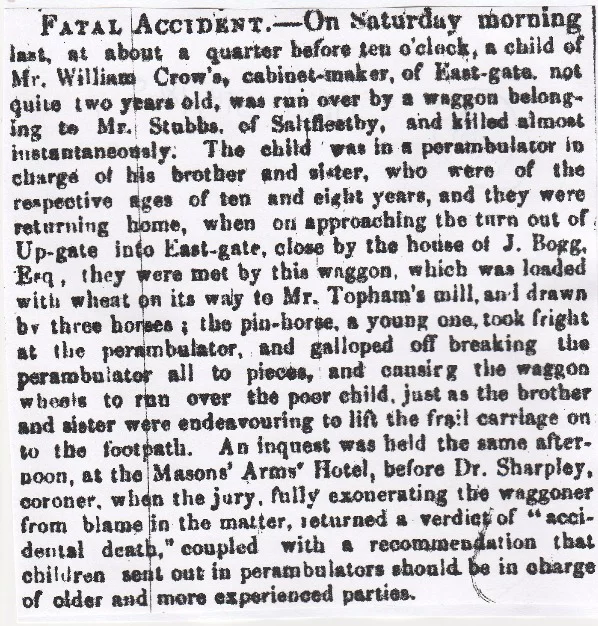
48/ Louth, October 1880 (Pensioners Suicide)
75-year-old Charles Atkinson, a former groom to Dr Bell for many years, committed suicide by poisoning himself with arsenic. The deceased killed himself at his lodging house in South Street Cottages, Spital Hill in Louth. Mrs Peters went to see him as he’d been ill and her five-year-old boy took a cup in his hand and he screamed at her not to let the boy touch the contents. When asked what was in it he replied magnesia, to make him feel better. It was actually filled with cold tea and some sort of powder. He later told her that he was about to die and could she help him upstairs to bed. Mrs Peters didn’t call for a doctor but his grandson instead. Mr Ennals, the doctor, came at seven o’clock and stayed until he died later on that evening. The grandson, 17-year-old Charles Atkinson, said that he was depressed about having sold his home and moved into lodgings. He took an ounce of laudanum in May but the doctor managed to save his life on that occasion.
49/ Spring Gardens, (Terrible Living Conditions) April 1879
“Unfortunate” women was a Victorian term for prostitutes and Spring Gardens behind the Turks Head was particularly rife and was a seedy part of Louth. The inquest was held at the Turks Head on the death of an illegitimate child of Alice Emma Grant of Spring Gardens. The mother of the child had been leading an immoral life and lived in Spring Gardens, a well-known place to all of doubtful repute. The child was born one morning with a midwife there and died within twelve hours. It seemed a bit suspect hence the coroner’s jury were asked to make an appearance. The coroner thought the child was a weakly one. The midwife said she had been twice before to Alice Grant’s, to deliver a child and the first was stillborn, the next died within three weeks. Death was due to natural causes.
50/ Louth Canal Suicide, December 1861
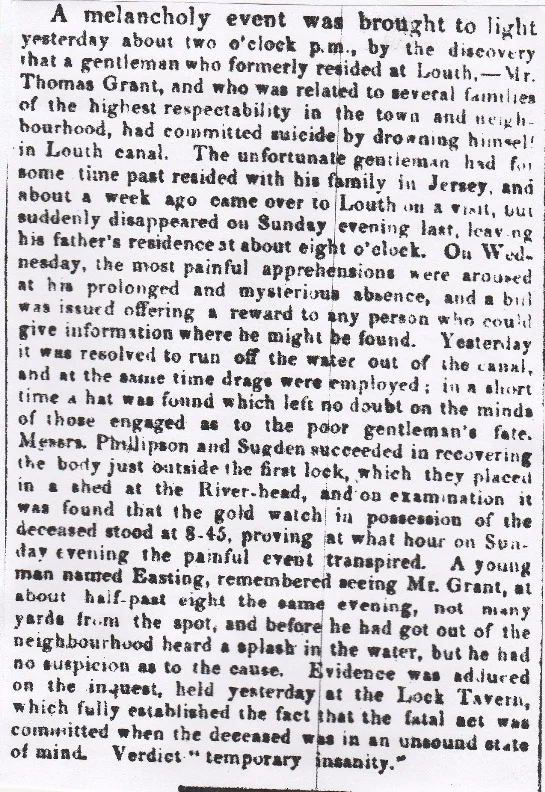
51/ Monks Dyke, Louth, (Child Drowned) June 1877
The lifeless corpse of John Thomas Davison aged two and a half was discovered in Monk’s Dyke one Saturday morning. He had gone out to play with another lad of the same age. They wandered along Monk’s Dyke for a considerable distance and when opposite Ryley’s brickyard, he fell in the water. His little friend ran home crying but could not say anything. The parents lived in North’s Yard and the invalid mother had to have help at home from a woman named Snowden, so life was tough, as her husband only worked on the railway. She sent a 13-year-old girl to help Mrs Davison that day and she fell asleep. Next, she heard her little boy was drowned. When police got to the scene of the accident the young boy had been lifted out of the water and was on dry land, but with an apron thrown over the body. The dyke was in a terrible condition and extremely unsanitary. The boy named Abel, who raised the alarm, was washing his two puppies when he saw the body of the boy lying on its back in the dyke. The verdict was death by drowning, with no blame attached to anyone.
52/ Louth Navigation Canal, Keddington, June 1878 (Girl Drowned)
11-year-old Sarah Brown was found in the Louth Canal having drowned there. She was “fostered ” by Mrs Larder at Keddington, who had her there for seven years, having been boarded out by the Guardians of the Louth Union. At the front of the house is a massive field which leads to water’s edge but had no fence. A neighbour heard a cry of “Help” coming from the water and she ran down and saw the girl, then she ran to get Mr.Larder. When they got there they could only see the fingers of girl, in the centre of the canal. Alfred Ticklepenny, (a busy man in the town!) went out in a boat and got her out but she was already dead when they reached the bank. Sarah used to go fishing for sticklebacks, but Mrs Larder was in the dark about this. Apparently, she fell in the water a few years ago and Mrs Larder forbade her to go near it again. She had been truant a few times but on the whole, was a good kid. This was adjudged by the jury to be nothing more than a tragic accident which resulted in the young girl drowning.
53/ Pye’s Lane Suicide, Louth, August 1875
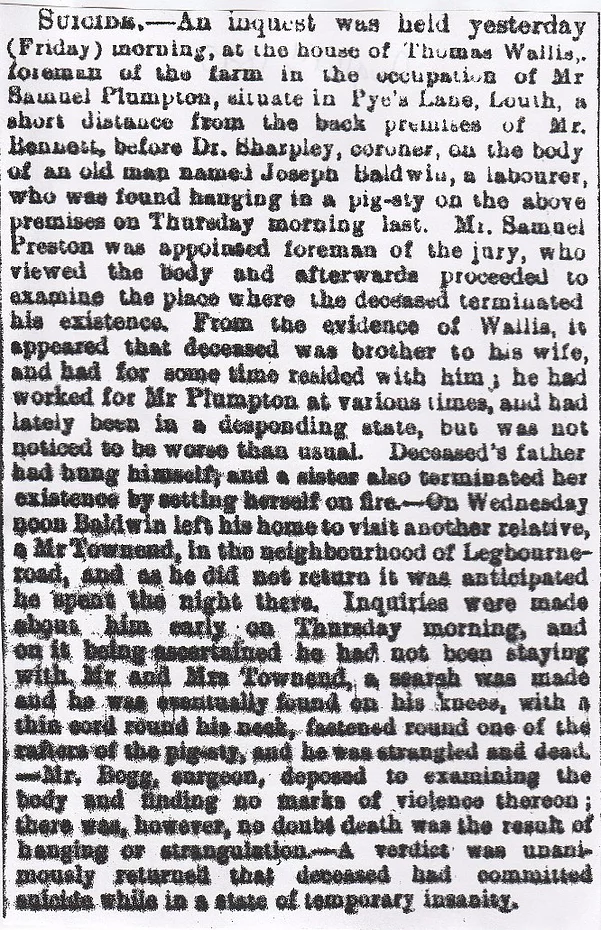
54/ James Street/Ticklepenny’s Lock, Louth, December 1869 (Townsman Vanishes)
George Ward was a well-known inhabitant of Louth, but he went missing on November 17th and was seen to labouring under the impression that his property would be confiscated and that he would be left in poverty. His housekeeper observed him at his house in James Street near Ramsgate, burning documents and papers just before his disappearing act. For the past three weeks the main talk around town, is “Where the hell is he?”. Rewards were offered, the canal dragged and relatives in other towns written to, asking if they’d seen him. He was finally discovered in Ticklepenny’s Lock, when it was dragged, with the body taken to the Woolpack Inn, Riverhead and placed in an outhouse. His corpse was in an amazing condition and the coroner had just received that day a most vile and scandalous anonymous letter implicating certain people in his disappearance. When discovered, the face was caked in mud and in his pockets were a comb, seven keys, a knife, handkerchief and rather oddly, a pair of nutcrackers. There is no doubt that the body had laid in a hollow made by machines that scoop out the mud from the canal bed and there must have been thirty of these machines pass over, thus embedded the corpse in the mud. The letter the coroner got, said that he’d been murdered and left to decompose until all traces of violence had vanished, then he would be lobbed into the river. The deceased had been playing dominoes with a friend of his, Mr Cox, but his behaviour seemed odd. The housekeeper said that he became suicidal a couple of years and had been watched. He thought he had no money but had just banked £300 and believed he had no watch, when in fact he had four of them. All in all, he was losing it! The verdict was that he was found dead in the canal, on the 7th December and the cause of death was drowning.
55/ Eastgate, Louth, April 1870 (Suicide by Poison)
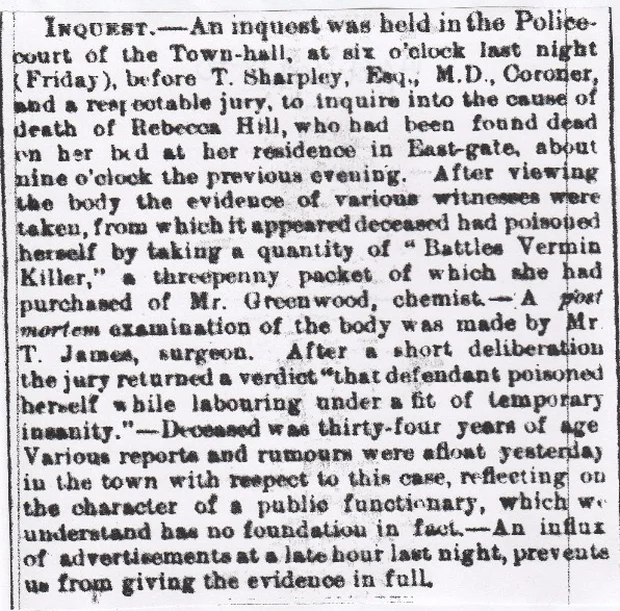
56/ Spital Hill, Louth, (Enveloped in Flames) March 1876
Alice Maud Mary Elam, nearly four years of age, met with an awful accident which caused her to be severely burned and this would ultimately end her life. The mother, Elizabeth Elam, lived at Spital Hill and had one day popped into next door’s house and left little Alice alone with a young boy. While she had been gone for five minutes she looked out of the window and saw her daughter enveloped in flames in the street. The flames were extinguished and she was whisked off to hospital. The young lad who was with her, her brother, John, said that she had lit a piece of paper and her dress caught fire by accident. She ran into the street which fanned the flames and before he knew it, she was engulfed. Alice died of her appalling burns the next morning. There was a recommendation that every dwelling-house should have a fire guard and this would help save the lives of dozens, if not hundreds, of child victims who died in the same way.
57/ Market Place, Louth, (Fatal Accident) August 1869
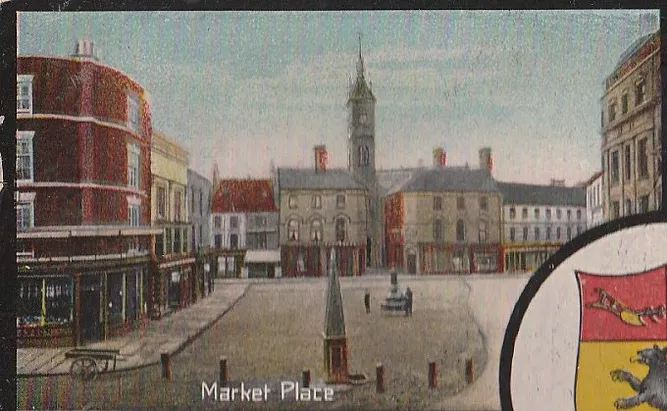
69-year-old Francis Markham was a well-respected member of the community in Louth, and who worked as a bricklayer for J.Motson Thompson, a builder in the town. Francis was on the top of some scaffolding, in front of the shop which used to be Mr Allen the confectioners and adjoining those of Cosworth’s grocer in the Market Place, which had been bought by him, and was now being renovated. He overbalanced while up there and fell down on the pavement below, smashing his head on the tiles and breaking the spout in the adjoining premises, Dawson’s butchers, then he landed in the street. He had terrible gashes and lacerations to his head and within half an hour the poor chap had expired. The fall was around a thirty feet drop and the son explained that his father’s eyesight was beginning to let him down and he had suffered a mild attack of sciatica recently. The verdict was one of “Accidental Death”.
58/ Westgate Suicide, Louth, October 1870
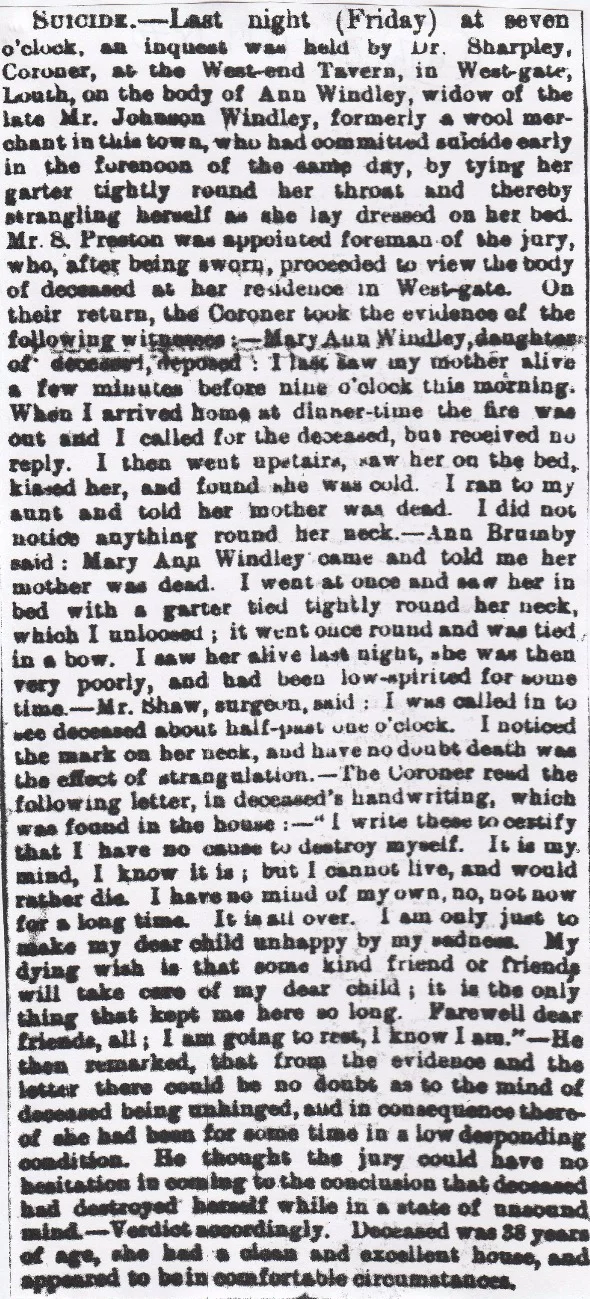
59/ Louth Navigation Canal, (Child Drowned) July 1875
Eight and a half-year-old Joseph Proctor was found dead, floating in the Louth Navigation Canal. The father, Thomas Proctor, said he had been sent to Mrs Nell’s garden to fetch some vegetables in a basket. At the spot he was discovered, he must have bent down to get a drink from the spring and somehow, whether, by the wind blowing him in or a dizzy spell, he ended up in the water. He was found near a stone trough into which water is conducted from a spring in order to supply vessels, adjoining the wall of the canal basin. The verdict was “Accidentally drowned”.
60/ River Lud, Louth, Child Drowned) May 1874
Another drowning of a small child in the town of Louth. I’m surprised there were any kids left in Victorian times, as they were either burned or drowned in some tragic event every month or so. This was William Arthur Little, whose father was the superintendent of Louth Gasworks and he ended up drowning in the River Lud. He was playing with three other kids in the back-yard, two who were about seven and the other about the same age as William, three and a half years old. They wandered off together and he was found near the water-mill adjoining the gas-works, where he was pulled him out of the water, then handed to his father who took him inside. He bathed him in warm water and rubbed him with salt (?) in order to revive him, all to no avail. Apparently, the River Lud was in a right state, the banks were falling apart and it was filthy, but again it was a verdict of Accidentally Drowned”, which seems to a very popular one in Louth.
Eastgate, Louth, Early 1900’s
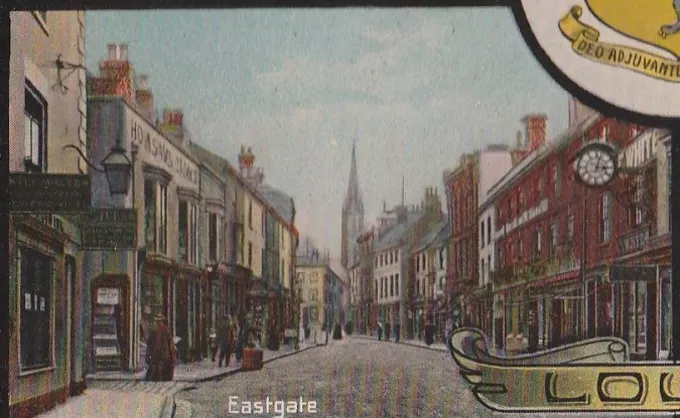
61/ Eastgate, Louth, (Near White Swan) June 1877 (See postcard above)
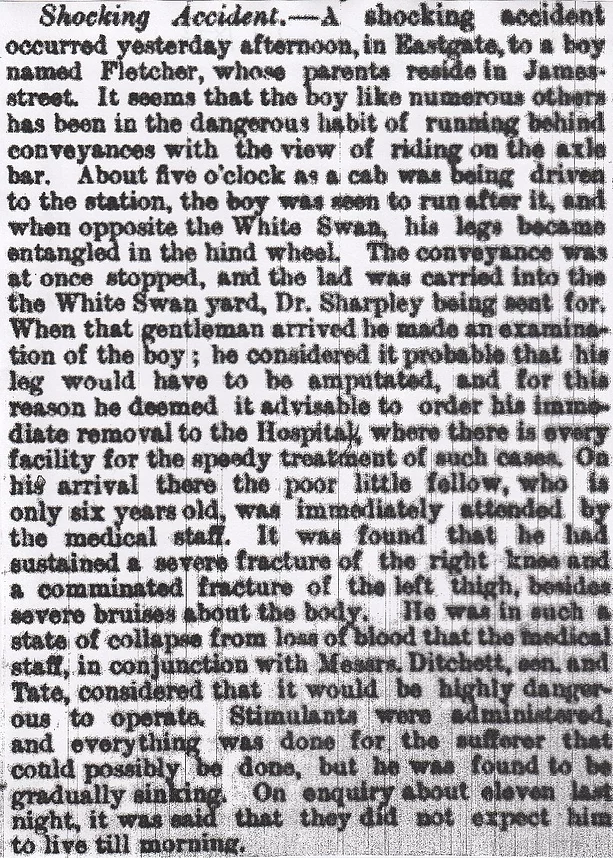
62/ Eastgate, Louth, January 1890 (Suicide by Hanging)
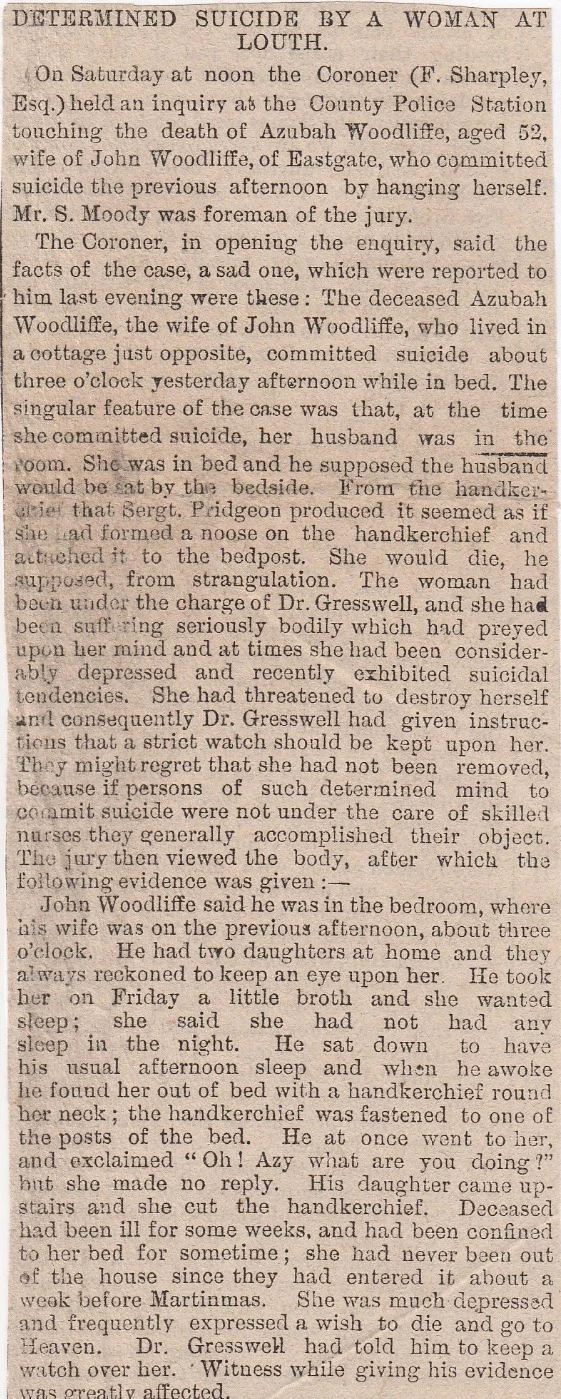
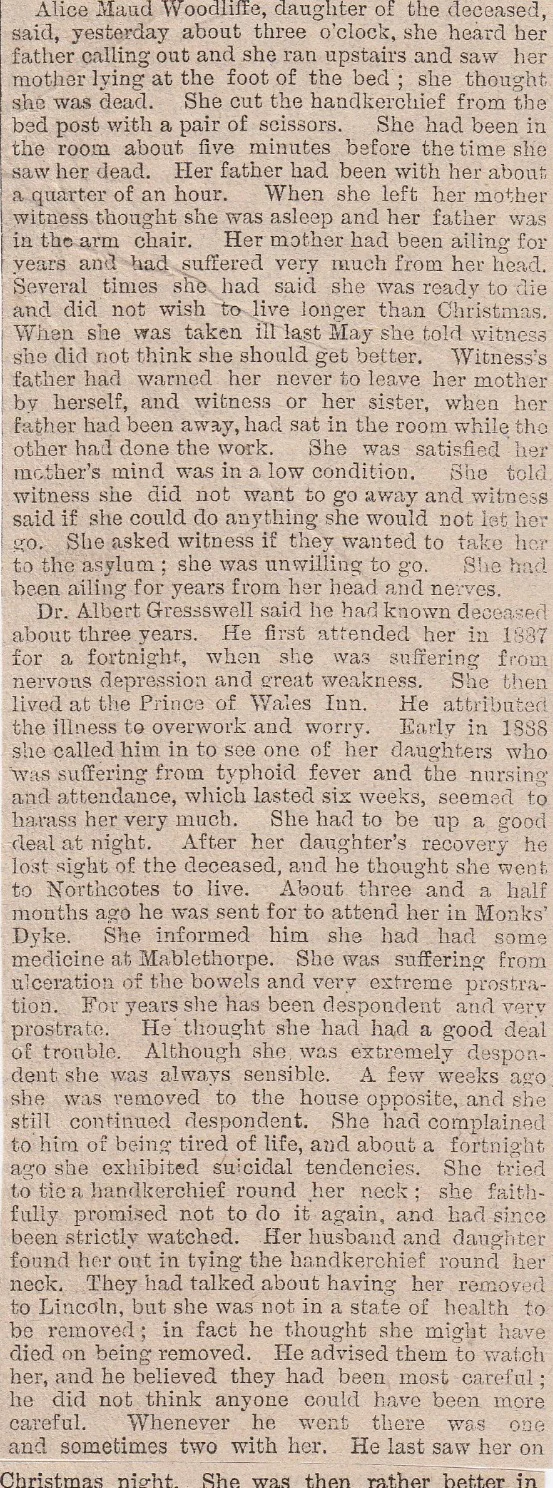
health, but rather despondent. She complained of her head a good deal. He thought she was suffering from temporary insanity at the time she committed suicide. The jury returned a verdict of “Suicide whilst temporarily insane” and the Coroner prepared an inquisition to this effect.
63/ Louth Murder, (Peter Blanchard) 7th March 1875
Possibly the most infamous murder in the history of Louth. Peter Blanchard aged twenty-six, a tanner, had been seeing 22-year-old Louise Hodgson for about four years but a sudden pang of jealousy interfered in the relationship. He confronted her when she was leaving the Free Methodist Chapel in Eastgate when they walked to her father’s house. Later on, an argument broke out and he stabbed her in the chest. Louise was dead within a few minutes and police caught up with Blanchard within the hour. The father lived in New-market and he stabbed her in the passageway at the side of the house.
March 13th, 1875
The funeral of Louise Hodgson took place at Louth Cemetery on Wednesday afternoon, in the presence of 1200-1500 spectators.
The prisoner left Louth by the 6-24 a.m. train, bound for Lincoln, with around 400-500 persons waiting on the platform ready to watch him leave. At the principal stations through which the train passed, crowds had gathered to catch a glimpse of the murderer. He was safely lodged in Lincoln Castle within 36 hours of the commission of the murder.
March 20th, 1875
At Lincoln Assizes, Friday the 12th, an application was made on the part of the defence of Peter Blanchard, charged with the murder of Louise Hodgson at Louth. The testimony was rather peculiar as regarded the epileptic fits and their influence on the mind of a prisoner.
64/ Louth Murderer Execution, August 1875
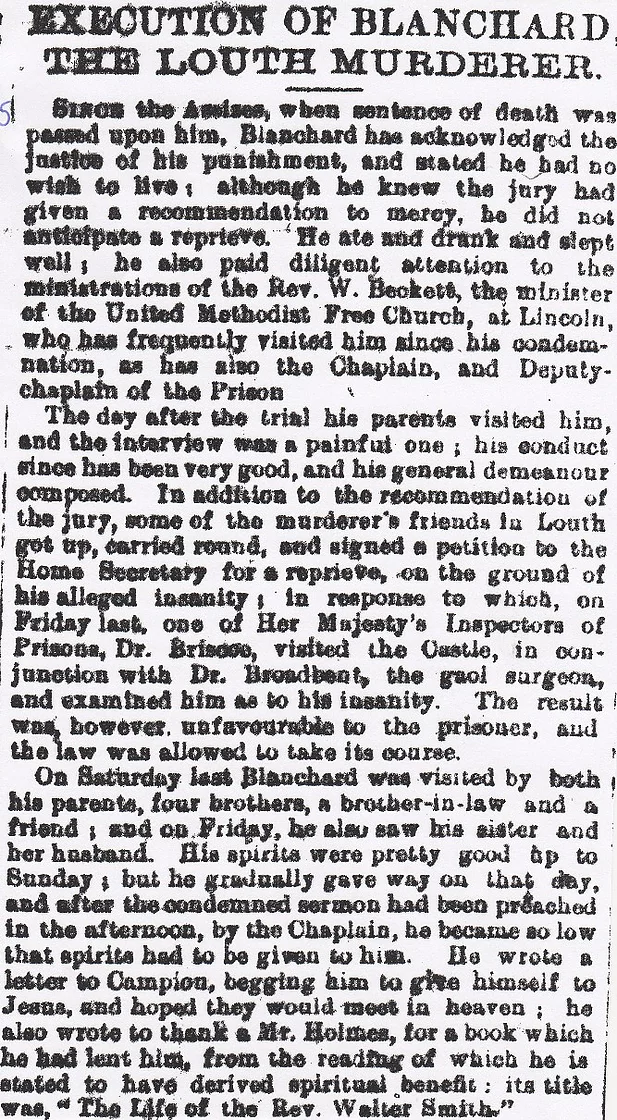
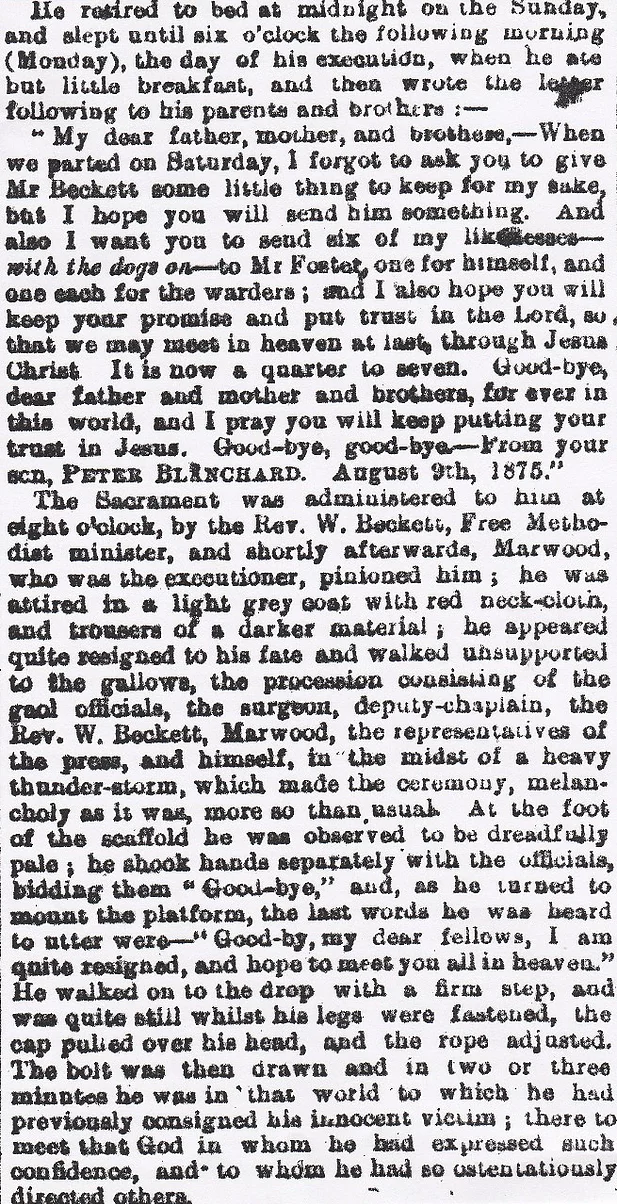
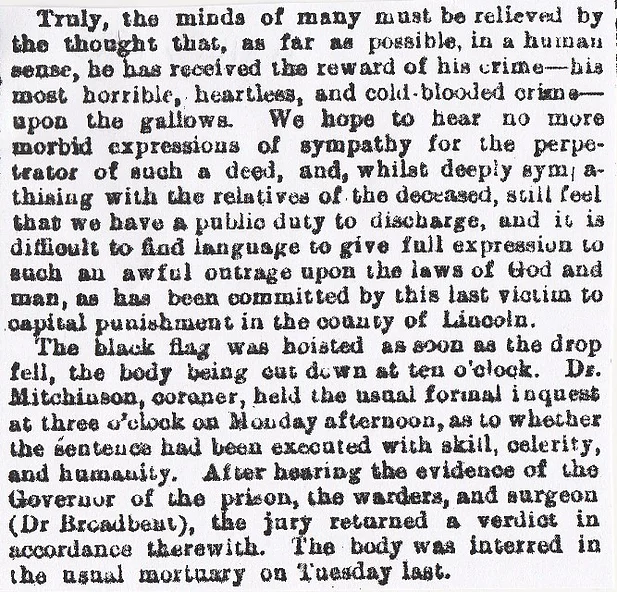
65/ Charles Street area, Louth, May 1877 (Brother of Louth Murderer)
A boy named Henry Blanchard whose parents reside near the brickyard in Charles Street, died very suddenly on Thursday morning last. He was out playing in the fair on the previous night and appeared to be enjoying himself very much. The deceased was between twelve and thirteen years of age and was the brother of Peter Blanchard.
66/ Louth Prison Death, (House of Correction?) October 1869
41-year-old Henry Barnes was a prisoner in Louth gaol and died from an epileptic seizure one morning. He was there under four charges of the Vagrancy Act by magistrates in Louth and at Grimsby. He was put to work on the tread-wheel, but by order of the surgeon he was excused hard labour and put on a third class diet of food. Knowing about his seizures he was placed in a cell with two other inmates, Elliott and Horrocks. Since the suicide last year (See below), there was a communication fixed to each cell window by means of a bell, used to alarm warders in case of illness or a suicide attempt. The other cellmates saw him writhing about in a violent fit, then he rolled out of bed and fell to the floor. When the turnkey arrived in the morning he was found dead.
67/ Louth House of Correction Suicide, December 1868
Teenager Santy Beverley was slapped into prison on a charge of robbery with violence in Grimsby and was brought to Louth to serve his time. He’d been here before on charges of drunkenness and assaulting his parents at Grimsby. To sum him up, he was a bone idle habitual criminal and he had threatened to kill himself many a time and tried to commit suicide twice. The cell was in an old part of the prison and was in a wretched state. He asked a fellow prisoner what sentence he thought they’d get but he was told to shut his mouth. When breakfast arrived a warder found him hanging by the window and he was cold to the touch, with rigor mortis setting in. He tied a scarf to the window and hung himself that way.
68/ Louth Canal, Keddington, (Body Found) July 1866
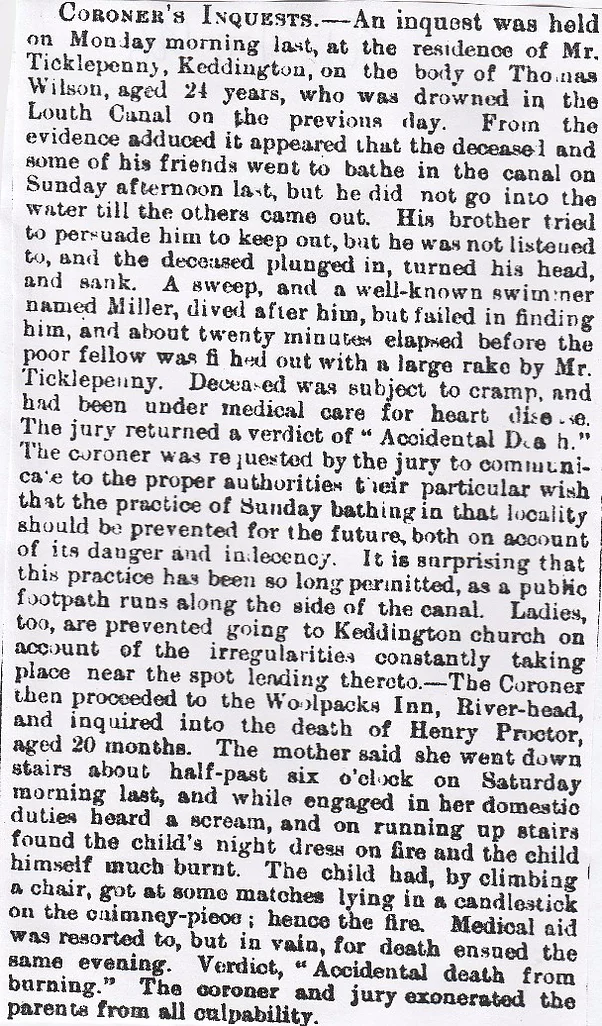
69/ Louth Canal Suicide, September 1880
Another day and another person in Victorian Louth gets fed up with life and jumps into the canal to end it all. This one was Thomas Swaby aged thirty-one, from Louth. John Robinson was off down to the Canal for a quick dip and saw some men with a rake fishing around the canal. One of them told him that Thomas Swaby had drowned, as he’d found his hat and coat, so rather obligingly John put on his trunks and dived in to find the body. He brought it to the surface, while his coat pockets were searched and in them was a letter, some photos and handkerchief. Alfred Ticklepenny was out and about again! He said he saw deceased at 8-40 a.m. near Keddington Lock. A mate of his said that he had stayed with him the night before, then left at eight a.m. with nothing to eat or drink. Another witness said he stopped at the place a woman drowned herself some time ago, stood and pondered for a while, twiddling with leaves in his fingers. Swaby had twenty-five photos of women in his pocket, most of them public characters, with the letter mentioning family arguments but little else. The brother of Thomas, Isaac Swaby, told the jury that he got very morose when he’d been drinking and lately he had been knocking it back as if was going out of fashion. He had also threatened suicide when he had been on the ale. The verdict was “Drowned himself whilst in a fit of temporary insanity”.
70/ Spring Gardens Death, Louth, (Squalid Conditions) September 1875
Thomas Burke, an Irish labourer aged forty-two, accidentally fell down the stairs at his lodgings in Spring Gardens and killed himself. When the jury went to visit the house to examine the staircase, they were overcome by an unbelievable stench. The wife, Mary Ann Burke, said they lived at Spring Gardens with six children, the eldest was ten years old. He had been to the Black Horse for a drink and he came in, she pulled off his boots and got him into bed. Later on, while she was outside talking to somebody she heard him fall and he muttered, “Mary Ann I’m killed; I’m done for”. He seemed paralysed and had blood coming from his nose. She tried to get a drink to his lips but within twenty minutes he was dead. When the surgeon arrived he was quite dead, thinking that the cause of death was due to dislocation of the neck. The deceased and the family had lived in these squalid conditions for the past five years and this was reported to the Sanitary Officers and notice was given to cleanse the premises.
71/ Titley’s Brickyard (Charles St/Holmes Lane) October 1886
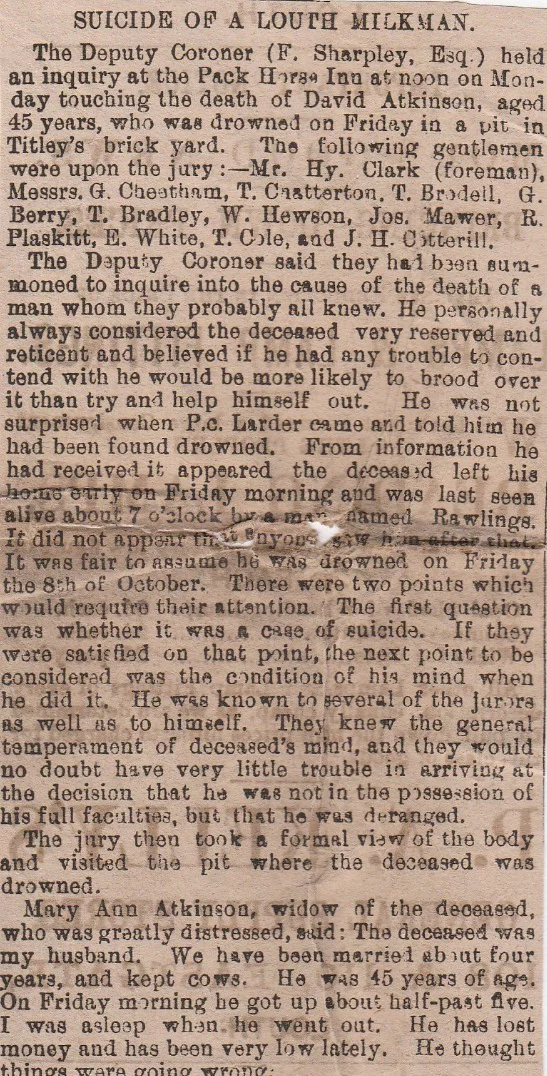
David Daniel Rawlings, country letter carrier,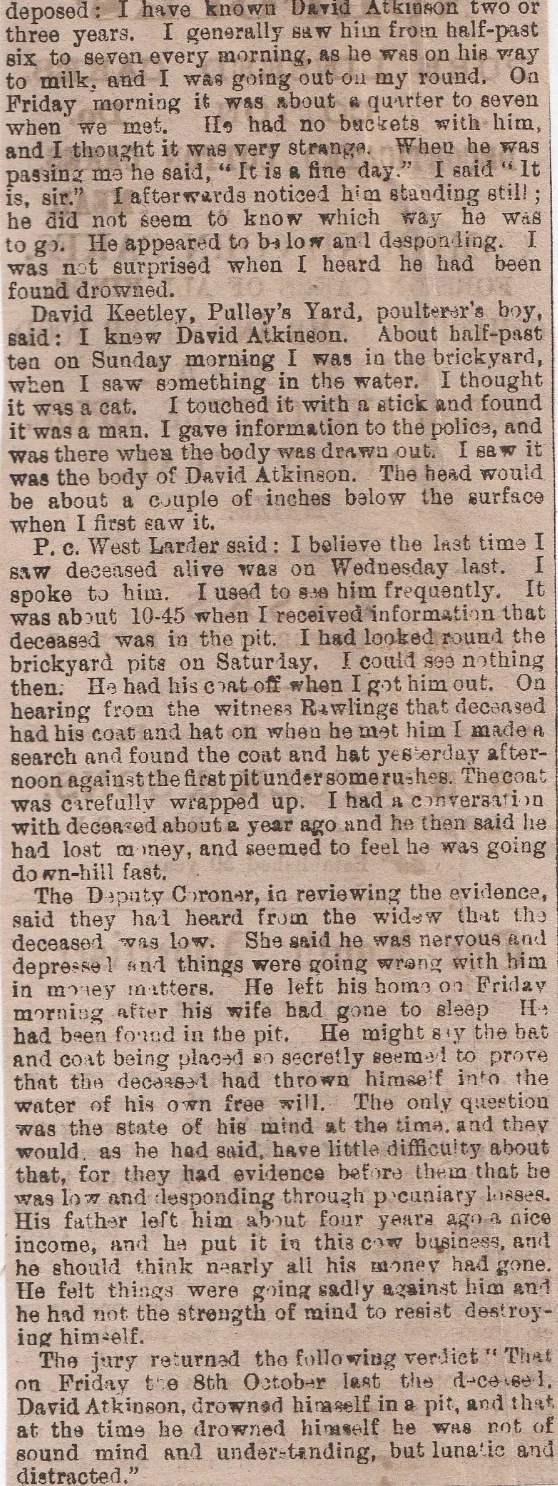
72/ Louth Canal near Keddington Lock (Sad tale this one) May 1879
If you’re one of those people into the paranormal, then I suggest you get your E.V.P. box and go down to the canal at Louth, as there must be dozens of spirits floating about here. Another suicide! This was in broad daylight, afternoon in fact. Benjamin Sanderson was in his garden when he spotted the female walking briskly on the footpath when she next appeared to be jumping into the canal. He got the garden rake and ran to help her. He followed the noise of the screams and being elderly he didn’t dive in after her, but tried as best he could. She sank in a couple of minutes in one of the deep parts of the canal, maybe 7-8 feet deep. Mr Ticklepenny at the next lock, was called for and he dragged the area and about an hour and a half later she was discovered. There was a piece of paper in her purse with the following lines written on it:
“We yet may meet again .- Though sorrow’s clouds are o’er us now, And I must soon depart, Perhaps for years, in foreign lands, To roam with aching heart, We still may hope that happier days, In store for us remain, And though we part in anguish now, We yet may meet again. Oh well I know, when far away, You oft will think of me, What truth is in my gentle voice, And breathes ” I live for thee”, Yet faithful still in every clime, If rained to higher station, Though distance may divide us now, We yet may meet again”.
Police discovered that it was the body of 37-year-old Elizabeth Alcock, living at 11, Nichol Hill in Louth. Her husband was a good for nothing waster bordering on alcoholic and violent with it. Elizabeth brought in most of the money by charring and washing, which he spent in pubs. There were five kids to feed and clothe as well. A man, Allan Atkin, whom she did charring work for, said she seemed more despondent than ever when he saw her last. This was on account of her husband being drunk again, then she mumbled, “I wish I was dead”. The husband was next up and he said they’d been married eighteen years and had five children, the youngest was five and the eldest was sixteen. They mentioned about his lack of work, how they managed, and so on. The husband went to see if his wife was at Atkin’s house but she wasn’t. (Did he think there was something going on between them?)
The verdict was one of suicide whilst of unsound mind, but they also added that this was brought on by the ill-treatment at the hands of her husband. Poor lass!
73/ Batty’s Passage, Maiden Row, Louth, March 1875 (Illegitimate Child)
Arthur Codd was the four-month-old child Anne Codd, a domestic servant, who died suddenly on Tuesday, March 2nd. It was so sudden the coroner was a bit weary of the circumstances that led to his demise. Arthur was the illegitimate child of Anne Codd who was working elsewhere, so used to pass the child on to others to look after him. One such person was a woman named Flears, of Batty’s Passage, Maiden Row. When the jury went to visit the place where the child’s body was at Flears house, this was written about it:
The room the jury visited is one of the most wretched dens in the Borough. Damp, dark, and miserable. Many stables and even pig-sties are a palace compared to this abode of wretchedness, for which the unhappy tenant pays one shilling a week. The owner of the property, a man named Brocklebank, had a visit from the Sanitary officers, in order to close the same for human habitation, was considered necessary by some of the jury”.
Flears said that Anne brought the child for her to nurse about a fortnight ago. She paid me three shillings and sixpence a week. When she came to visit on her day off, she was told that he was ill. She said he’d be alright and not to worry about it. The baby wouldn’t eat one day so she gave it some…..GIN ! and then put it to bed. Later on, she went to check and the little fella was dead.
The mother said that it had a case of “the frog” (?) a while back and hadn’t been the same since that. Basically, the young lass was getting no help from the father of little Arthur and her Dad was dead so she had to muddle through in life. It was left by the jury to return a verdict of “Death by Natural Causes”.
74/ Walkergate/Maiden Row, (Fatal Accident) October 1871
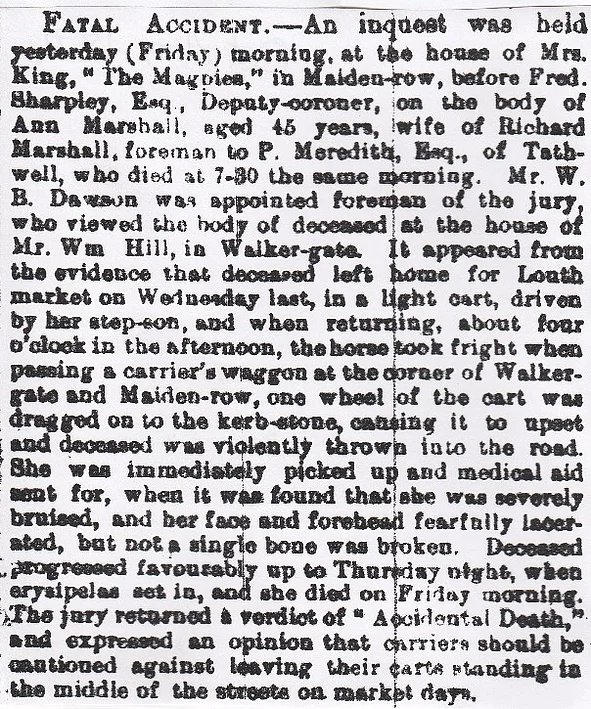
75/ Eastgate, Louth, (Cart Runs Over Man) June 1878
A terrible accident occurred in Eastgate when two horses and a cart, belonging to W.H.Smyth, of Elkington Hall, being driven by Henry White and his son, when near the Post Office the horses were scared by the sound of two buskers playing the cornet and a euphonium. The horses reared up and bolted down Eastgate and White was holding the reins trying to calm them down. They passed the Packhorse Hotel and they knocked over a grocer’s stall and here White fell off and was run over the chest. White got up but was sat down on a chair and given a brandy. The owner of the waggon, W.H.Smyth, was passing by and stayed with his waggoner then, later on, took him to hospital. The fatality occurred further on down the street, when a wheel of the cart flew off, it hit the curb in front of Mr Colam’s shop. Mr Colam was up a ladder and got out of the way when the wheel smashed into Mr Somerton’s window. At this precise time, Matthew Bell came out of Jesse Hall’s shop when the wheel ricocheted and went straight into his chest. He was on the floor, blood oozing from his ear, and quite unconscious. It was put down as an accidental death, but it was the buskers playing without permission that startled the horse and set this series of near misses and close shaves in motion.
76/ Willows Lock, Louth Canal (Female Fished Out) September 1877
51-year-old Betsy Carritt was found dead in the Louth canal near to Willows Lock. Her husband, Edward Carritt, saw her on Saturday afternoon when she went to the Market, which was quite a journey for a woman of her age. Later on that evening a man came and told him that he could hear his wife screaming. They got a lantern and went to search for her. They went to Ticklepenny’s and got the drag, but in the meantime, her corpse had been found in the canal. She was pulled out around 9-30 p.m., with the basket of food in the centre of the lock. She had been for a wee dram at the “Marquis of Granby” around eight p.m., coupled with her short-sightedness, that the husband said she suffered from and also being tired and it being dark, these things contributed to her accidental death.
77/ Norfolk’s Lock, Louth Canal, December 1870
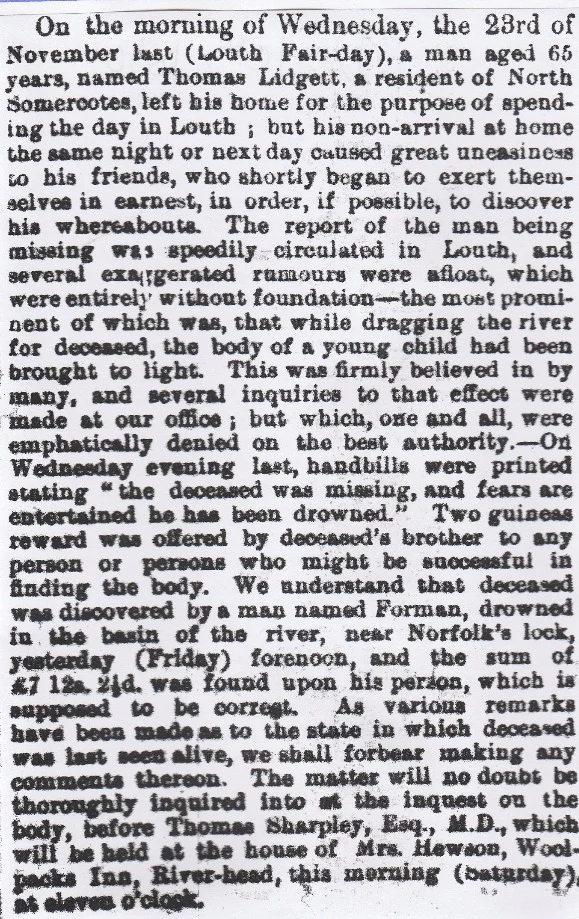
78/ Lee Street Suicide, Louth, August 1886
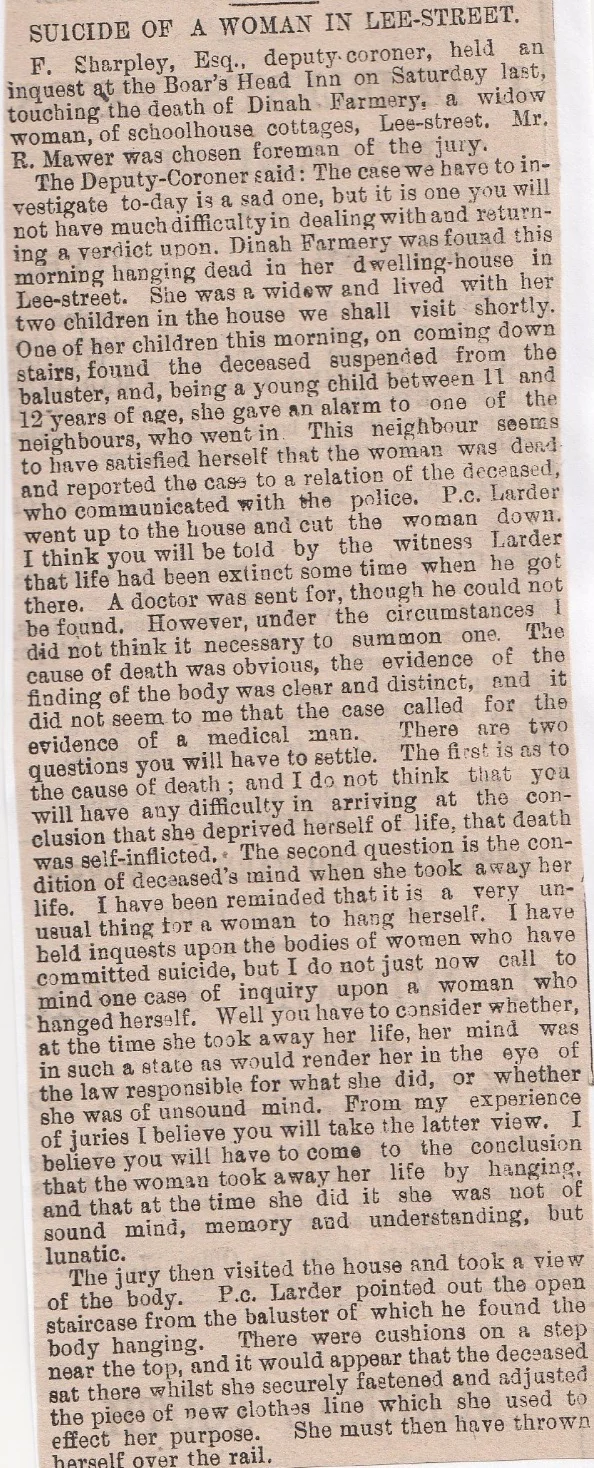
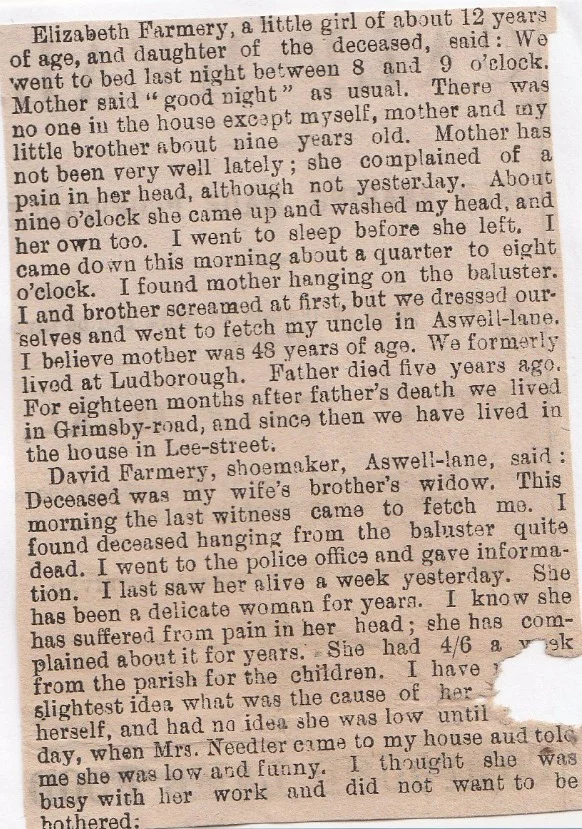
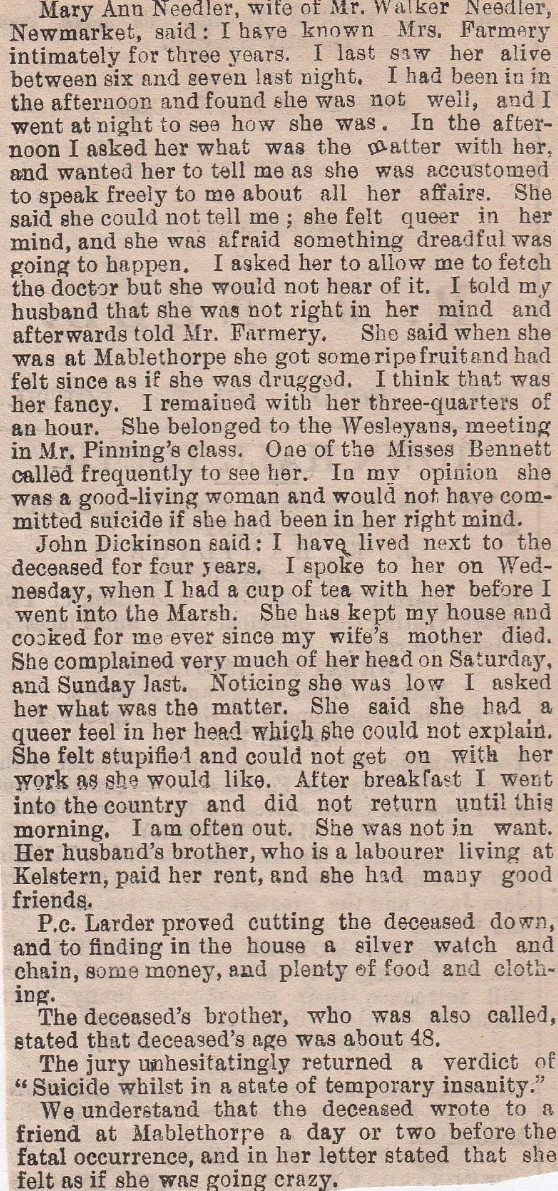
79/ Louth, (Fathers Suicide) March 1884 (See Number 30 also)
An old man named David Bee aged sixty-nine years, hanged himself in his own home. This was the father of the lass who drowned herself in 1874 near to Norfolk’s Mill on the Louth Canal (see number 30). Mrs Bee was obviously in a terrible state, having lost her daughter a decade ago to suicide, then finding her husband swinging from a rope in the kitchen, she wasn’t very well. Mrs Bee said he’d been despondent for many years now and it seemed as though he was just waiting for life to end and going through the motions. A neighbour named Charles Joseph Archer cut him down and tried to give him some brandy, but he was dead. His feet were touching the ground and he was in a stooping position if he’d stood upright his feet would have been on the floor. The doctor certified that when he arrived Mr Bee was already lifeless. He had severe ligature marks where the cord had dug into his neck. He also added that Mr Bee suffered from epilepsy, having two or three seizures and also from melancholia (depression). The verdict of “Suicide whilst of unsound mind”.
80/ Vicker’s Lane, Louth, (Death While in Labour) April 1864
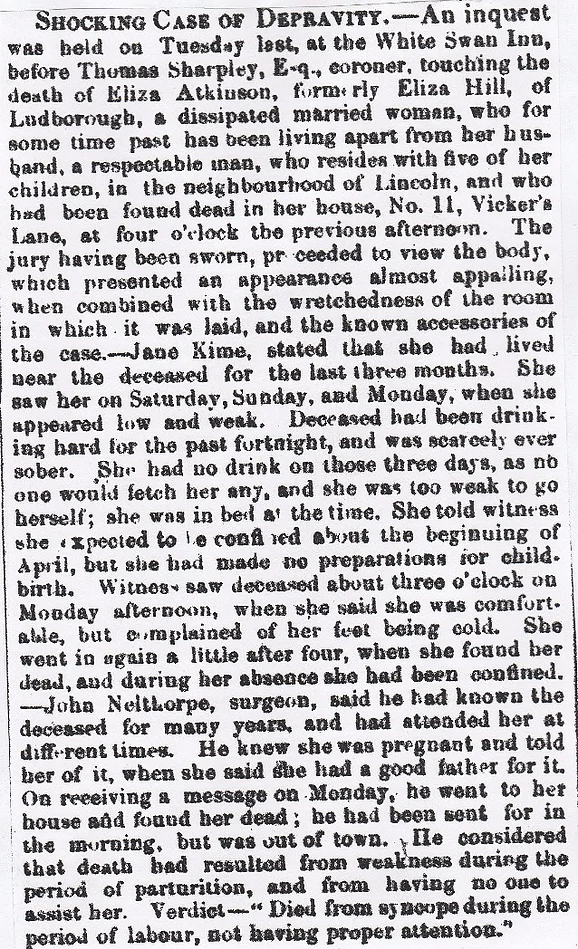
Syncope- temporary loss of consciousness caused by a fall in blood pressure.
